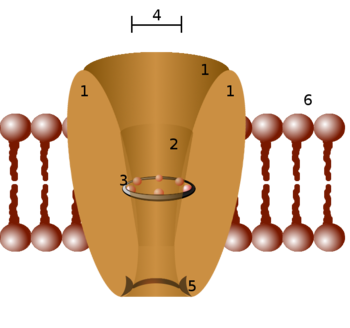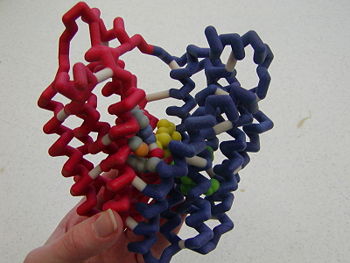This old version of Proteopedia is provided for student assignments while the new version is undergoing repairs. Content and edits done in this old version of Proteopedia after March 1, 2026 will eventually be lost when it is retired in about June of 2026.
Apply for new accounts at the new Proteopedia. Your logins will work in both the old and new versions.
Membrane Channels & Pumps
From Proteopedia
Membrane Channels & Pumps are two families of biological membrane proteins which allow the passive and active transport respecitvely of various biological compounds across membrane barriers.
Articles in Proteopedia concerning Membrane Channels & Pumps include:
- 5-HT3 receptor
- Aquaporin
- Chloride Ion Channel
- Chloride Ion Channel Analysis
- Chloride Intracellular Channel Protein 2
- Glutamate Receptor
- Gramicidin Channel in Lipid Bilayer
- Hemolysin
- Ion Channels
- M2 Proton Channel
- Mechanosensitive Channels: Opening & Closing
- Potassium Channel
- Proton Channels (includes a morph of the channel opening and closing)
- Sodium-Potassium ATPase (Sodium-Potassium Pump)
- Voltage-gated calcium channels
To view automatically seeded indices concerning Membrane Channels & Pumps See:
- Ion Channel
- Ion Transport
- Ligand Channel
- Mechanosensitive Channel
- Potassium Channels
- Proton Pump
- Transport Proteins
Membrane Transport Proteins
Membrane Transport Proteins are proteins involved in the movement of ions, small molecules, or macromolecules, across biological membranes.
Articles in Proteopedia concerning Membrane Transport Proteins include:
- A Physical Model of the β2-Adrenergic Receptor
- Lactose Permease
- Enzyme I of the Phosphoenolpyruvate:Sugar Phosphotransferase System
- Urea Transporter
To view automatically seeded pages concerning Membrane Transport Proteins See:
Proteopedia Page Contributors and Editors (what is this?)
David Canner, Alexander Berchansky, Eric Martz, Wayne Decatur, Jaime Prilusky


